- Home
- Anthony Trollope
Nina Balatka Page 2
Nina Balatka Read online
Page 2
CHAPTER I
Nina Balatka was a maiden of Prague, born of Christian parents, andherself a Christian--but she loved a Jew; and this is her story.
Nina Balatka was the daughter of one Josef Balatka, an old merchantof Prague, who was living at the time of this story; but Nina's motherwas dead. Josef, in the course of his business, had become closelyconnected with a certain Jew named Trendellsohn, who lived in a meanhouse in the Jews' quarter in Prague--habitation in that one allottedportion of the town having been the enforced custom with the Jews then,as it still is now. In business with Trendellsohn, the father, therewas Anton, his son; and Anton Trendellsohn was the Jew whom NinaBalatka loved. Now it had so happened that Josef Balatka, Nina'sfather, had drifted out of a partnership with Karil Zamenoy, a wealthyChristian merchant of Prague, and had drifted into a partnership withTrendellsohn. How this had come to pass needs not to be told here, asit had all occurred in years when Nina was an infant. But in theseshiftings Balatka became a ruined man, and at the time of which I writehe and his daughter were almost penniless. The reader must know thatKaril Zamenoy and Josef Balatka had married sisters. Josef's wife,Nina's mother, had long been dead, having died--so said Sophie Zamenoy,her sister--of a broken heart; of a heart that had broken itself ingrief, because her husband had joined his fortunes with those of a Jew.Whether the disgrace of the alliance or its disastrous result may havebroken the lady's heart, or whether she may have died of a pleurisy, asthe doctors said, we need not inquire here. Her soul had been long atrest, and her spirit, we may hope, had ceased to fret itself in horrorat contact with a Jew. But Sophie Zamenoy was alive and strong, andcould still hate a Jew as intensely as Jews ever were hated in thoseearlier days in which hatred could satisfy itself with persecution. Inher time but little power was left to Madame Zamenoy to persecute theTrendellsohns other than that which nature had given to her in thebitterness of her tongue. She could revile them behind their back, or,if opportunity offered, to their faces; and both she had done often,telling the world of Prague that the Trendellsohns had killed hersister, and robbed her foolish brother-in-law. But hitherto the fullvial of her wrath had not been emptied, as it came to be emptiedafterwards; for she had not yet learned the mad iniquity of her niece.But at the moment of which I now speak, Nina herself knew her owniniquity, hardly knowing, however, whether her love did or did notdisgrace her. But she did know that any thought as to that was toolate. She loved the man, and had told him so; and were he gipsy as wellas Jew, it would be required of her that she should go out with himinto the wilderness. And Nina Balatka was prepared to go out into thewilderness. Karil Zamenoy and his wife were prosperous people, andlived in a comfortable modern house in the New Town. It stood ina straight street, and at the back of the house there ran anotherstraight street. This part of the city is very little like that oldPrague, which may not be so comfortable, but which, of all cities onthe earth, is surely the most picturesque. Here lived Sophie Zamenoy;and so far up in the world had she mounted, that she had a coach ofher own in which to be drawn about the thoroughfares of Prague and itssuburbs, and a stout little pair of Bohemian horses--ponies they werecalled by those who wished to detract somewhat from Madame Zamenoy'sposition. Madame Zamenoy had been at Paris, and took much delightin telling her friends that the carriage also was Parisian; but, intruth, it had come no further than from Dresden. Josef Balatka andhis daughter were very, very poor; but, poor as they were, they livedin a large house, which, at least nominally, belonged to old Balatkahimself, and which had been his residence in the days of his betterfortunes. It was in the Kleinseite, that narrow portion of the town,which lies on the other side of the river Moldau--the further side,that is, from the so-called Old and New Town, on the western side ofthe river, immediately under the great hill of the Hradschin. TheOld Town and the New Town are thus on one side of the river, and theKleinseite and the Hradschin on the other. To those who know Prague,it need not here be explained that the streets of the Kleinseite arewonderful in their picturesque architecture, wonderful in their lightsand shades, wonderful in their strange mixture of shops and palaces--and now, alas! also of Austrian barracks--and wonderful in theirintricacy and great steepness of ascent. Balatka's house stood in asmall courtyard near to the river, but altogether hidden from it,somewhat to the right of the main street of the Kleinseite as you passover the bridge. A lane, for it is little more, turning from the mainstreet between the side walls of what were once two palaces, comessuddenly into a small square, and from a corner of this square there isan open stone archway leading into a court. In this court is the door,or doors, as I may say, of the house in which Balatka lived with hisdaughter Nina. Opposite to these two doors was the blind wall ofanother residence. Balatka's house occupied two sides of the court,and no other window, therefore, besides his own looked either upon itor upon him. The aspect of the place is such as to strike with wonder astranger to Prague--that in the heart of so large a city there shouldbe an abode so sequestered, so isolated, so desolate, and yet so closeto the thickest throng of life. But there are others such, perhaps manyothers such, in Prague; and Nina Balatka, who had been born there,thought nothing of the quaintness of her abode. Immediately over thelittle square stood the palace of the Hradschin, the wide-spreadingresidence of the old kings of Bohemia, now the habitation of anex-emperor of the House of Hapsburg, who must surely find the thousandchambers of the royal mansion all too wide a retreat for the use of hisold age. So immediately did the imperial hill tower over the spot onwhich Balatka lived, that it would seem at night, when the moon wasshining as it shines only at Prague, that the colonnades of the palacewere the upper storeys of some enormous edifice, of which the brokenmerchant's small courtyard formed a lower portion. The long rows ofwindows would glimmer in the sheen of the night, and Nina would standin the gloom of the archway counting them till they would seem to beuncountable, and wondering what might be the thoughts of those whoabode there. But those who abode there were few in number, and theirthoughts were hardly worthy of Nina's speculation. The windows ofkings' palaces look out from many chambers. The windows of theHradschin look out, as we are told, from a thousand. But the roomswithin have seldom many tenants, nor the tenants, perhaps, manythoughts. Chamber after chamber, you shall pass through them by thescore, and know by signs unconsciously recognised that there is not,and never has been, true habitation within them. Windows almostinnumerable are there, that they may be seen from the outside--and suchis the use of palaces. But Nina, as she would look, would people therooms with throngs of bright inhabitants, and would think of the joysof happy girls who were loved by Christian youths, and who could dareto tell their friends of their love. But Nina Balatka was no coward,and she had already determined that she would at once tell her love tothose who had a right to know in what way she intended to dispose ofherself. As to her father, if only he could have been alone in thematter, she would have had some hope of a compromise which would havemade it not absolutely necessary that she should separate herself fromhim for ever in giving herself to Anton Trendellsohn. Josef Balatkawould doubtless express horror, and would feel shame that his daughtershould love a Jew--though he had not scrupled to allow Nina to gofrequently among these people, and to use her services with them forstaving off the ill consequences of his own idleness and ill-fortune;but he was a meek, broken man, and was so accustomed to yield to Ninathat at last he might have yielded to her even in this. There was,however, that Madame Zamenoy, her aunt--her aunt with the bitter tongue;and there was Ziska Zamenoy, her cousin--her rich and handsome cousin,who would so soon declare himself willing to become more than cousin,if Nina would but give him one nod of encouragement, or half a smile ofwelcome. But Nina hated her Christian lover, cousin though he was, aswarmly as she loved the Jew. Nina, indeed, loved none of the Zamenoys--neither her cousin Ziska, nor her very Christian aunt Sophie with thebitter tongue, nor her prosperous, money-loving, acutely mercantileuncle Karil; but, nevertheless, she was in some degree so subject tothem, that she knew that she was bound to
tell them what path in lifeshe meant to tread. Madame Zamenoy had offered to take her niece tothe prosperous house in the Windberg-gasse when the old house in theKleinseite had become poor and desolate; and though this generous offerhad been most fatuously declined--most wickedly declined, as auntSophie used to declare--nevertheless other favours had been vouchsafed;and other favours had been accepted, with sore injury to Nina's pride.As she thought of this, standing in the gloom of the evening under thearchway, she remembered that the very frock she wore had been sent toher by her aunt. But I in spite of the bitter tongue, and in spite ofZiska's derision, she would tell her tale, and would tell it soon. Sheknew her own courage, and trusted it; and, dreadful as the hour wouldbe, she would not put it off by one moment. As soon as Anton shoulddesire her to declare her purpose, she would declare it; and as he whostands on a precipice, contemplating the expediency of throwing himselffrom the rock, will feel himself gradually seized by a mad desire to dothe deed out of hand at once, so did Nina feel anxious to walk off tothe Windberg-gasse, and dare and endure all that the Zamenoys could sayor do. She knew, or thought she knew, that persecution could not go nowbeyond the work of the tongue. No priest could immure her. No law couldtouch her because she was minded to marry a Jew. Even the people inthese days were mild and forbearing in their usages with the Jews, andshe thought that the girls of the Kleinseite would not tear her clothesfrom her back even when they knew of her love. One thing, however, wascertain. Though every rag should be torn from her--though some priestmight have special power given him to persecute her--though theZamenoys in their wrath should be able to crush her--even though herown father should refuse to see her, she would be true to the Jew. Loveto her should be so sacred that no other sacredness should be able totouch its sanctity. She had thought much of love, but had never lovedbefore. Now she loved, and, heart and soul, she belonged to him to whomshe had devoted herself. Whatever suffering might be before her, thoughit were suffering unto death, she would endure it if her lover demandedsuch endurance. Hitherto, there was but one person who suspected her.In her father's house there still remained an old dependant, who,though he was a man, was cook and housemaid, and washer-woman andservant-of-all-work; or perhaps it would be more true to say thathe and Nina between them did all that the requirements of the housedemanded. Souchey--for that was his name--was very faithful, but withhis fidelity had come a want of reverence towards his master andmistress, and an absence of all respectful demeanour. The enjoyment ofthis apparent independence by Souchey himself went far, perhaps, inlieu of wages.
"Nina," he said to her one morning, "you are seeing too much of AntonTrendellsohn."
"What do you mean by that, Souchey?" said the girl, sharply.
"You are seeing too much of Anton Trendellsohn," repeated the old man.
"I have to see him on father's account. You know that. You know that,Souchey, and you shouldn't say such things."
"You are seeing too much of Anton Trendellsohn," said Souchey for thethird time. "Anton Trendellsohn is a Jew."
Then Nina knew that Souchey had read her secret, and was sure that itwould spread from him through Lotta Luxa, her aunt's confidential maid,up to her aunt's ears. Not that Souchey would be untrue to her onbehalf of Madame Zamenoy, whom he hated; but that he would thinkhimself bound by his religious duty--he who never went near priest ormass himself--to save his mistress from the perils of the Jew. Thestory of her love must be told, and Nina preferred to tell it herselfto having it told for her by her servant Souchey. She must see Anton.When the evening therefore had come, and there was sufficient dusk uponthe bridge to allow of her passing over without observation, she puther old cloak upon her shoulders, with the hood drawn over her head,and, crossing the river, turned to the left and made her way throughthe narrow crooked streets which led to the Jews' quarter. She knew thepath well, and could have found it with blindfolded eyes. In the middleof that close and densely populated region of Prague stands the oldJewish synagogue--the oldest place of worship belonging to the Jews inEurope, as they delight to tell you; and in a pinched-up, high-gabledhouse immediately behind the synagogue, at the corner of two streets,each so narrow as hardly to admit a vehicle, dwelt the Trendellsohns.On the basement floor there had once been a shop. There was no shopnow, for the Trendellsohns were rich, and no longer dealt in retailmatters; but there had been no care, or perhaps no ambition, at work,to alter the appearance of their residence, and the old shutters wereupon the window, making the house look as though it were deserted.There was a high-pitched sharp roof over the gable, which, asthe building stood alone fronting upon the synagogue, made it soremarkable, that all who knew Prague well, knew the house in which theTrendellsohns lived. Nina had often wished, as in latter days she hadentered it, that it was less remarkable, so that she might have gone inand out with smaller risk of observation. It was now the beginning ofSeptember, and the clocks of the town had just struck eight as Nina puther hand on the lock of the Jew's door. As usual it was not bolted,and she was able to enter without waiting in the street for a servantto come to her. She went at once along the narrow passage and up thegloomy wooden stairs, at the foot of which there hung a small lamp,giving just light enough to expel the actual blackness of night. On thefirst landing Nina knocked at a door, and was desired to enter by asoft female voice. The only occupant of the room when she entered was adark-haired child, some twelve years old perhaps, but small in statureand delicate, and, as appeared to the eye, almost wan. "Well, Ruthdear," said Nina, "is Anton at home this evening?"
"He is up-stairs with grandfather, Nina. Shall I tell him?"
"If you will, dear," said Nina, stooping down and kissing her.
"Nice Nina, dear Nina, good Nina," said the girl, rubbing her glossycurls against her friend's cheeks. "Ah, dear, how I wish you livedhere!"
"But I have a father, as you have a grandfather, Ruth."
"And he is a Christian."
"And so am I, Ruth."
"But you like us, and are good, and nice, and dear--and oh, Nina, youare so beautiful! I wish you were one of us, and lived here. There isMiriam Harter--her hair is as light as yours, and her eyes are asgrey."
"What has that to do with it?"
"Only I am so dark, and most of us are dark here in Prague. Anton saysthat away in Palestine our girls are as fair as the girls in Saxony."
"And does not Anton like girls to be dark?"
"Anton likes fair hair--such as yours--and bright grey eyes such asyou have got. I said they were green, and he pulled my ears. But nowI look, Nina, I think they are green. And so bright! I can see my ownin them, though it is so dark. That is what they call looking babies."
"Go to your uncle, Ruth, and tell him that I want him--on business."
"I will, and he'll come to you. He won't let me come down again, sokiss me, Nina; good-bye."
Nina kissed the child again, and then was left alone in the room. Itwas a comfortable chamber, having in it sofas and arm-chairs--much morecomfortable, Nina used to think, than her aunt's grand drawing-room inthe Windberg-gasse, which was covered all over with a carpet, after thefashion of drawing-rooms in Paris; but the Jew's sitting-room was dark,with walls painted a gloomy green colour, and there was but one smalllamp of oil upon the table. But yet Nina loved the room, and as she satthere waiting for her lover, she wished that it had been her lot tohave been born a Jewess. Only, had that been so, her hair might perhapshave been black, and her eyes dark, and Anton would not have liked her.She put her hand up for a moment to her rich brown tresses, and feltthem as she took joy in thinking that Anton Trendellsohn loved to lookupon fair beauty.
After a short while Anton Trendellsohn came down. To those who knowthe outward types of his race there could be no doubt that AntonTrendellsohn was a very Jew among Jews. He was certainly a handsomeman, not now very young, having reached some year certainly in advanceof thirty, and his face was full of intellect. He was slightly made,below the middle height, but was well made in every limb, with smallfeet and hands, and smal
l ears, and a well-turned neck. He was verydark--dark as a man can be, and yet show no sign of colour in hisblood. No white man could be more dark and swarthy than AntonTrendellsohn. His eyes, however, which were quite black, were verybright. His jet-black hair, as it clustered round his ears, had in itsomething of a curl. Had it been allowed to grow, it would almost havehung in ringlets; but it was worn very short, as though its owner werejealous even of the curl. Anton Trendellsohn was decidedly a handsomeman; but his eyes were somewhat too close together in his face, and thebridge of his aquiline nose was not sharply cut, as is mostly the casewith such a nose on a Christian face. The olive oval face was withoutdoubt the face of a Jew, and the mouth was greedy, and the teeth wereperfect and bright, and the movement of the man's body was the movementof a Jew. But not the less on that account had he behaved withChristian forbearance to his Christian debtor, Josef Balatka, and withChristian chivalry to Balatka's daughter, till that chivalry had turneditself into love.
"Nina," he said, putting out his hand, and holding hers as he spoke, "Ihardly expected you this evening; but I am glad to see you--very glad."
"I hope I am not troubling you, Anton?"
"How can you trouble me? The sun does not trouble us when we want lightand heat."
"Can I give you light and heat?"
"The light and heat I love best, Nina."
"If I thought that--if I could really think that--I would be happystill, and would mind nothing."
"And what is it you do mind?"
"There are things to trouble us, of course. When aunt Sophie says thatall of us have our troubles--even she--I suppose that even she speaksthe truth."
"Your aunt Sophie is a fool."
"I should not mind if she were only a fool. But a fool can sometimes beright."
"And she has been scolding you because--you--prefer a Jew to aChristian."
"No--not yet, Anton. She does not know it yet; but she must know it."
"Sit down, Nina." He was still holding her by the hand; and now, as hespoke, he led her to a sofa which stood between the two windows. Therehe seated her, and sat by her side, still holding her hand in his."Yes," he said, "she must know it of course--when the time comes; andif she guesses it before, you must put up with her guesses. A few sharpwords from a foolish woman will not frighten you, I hope."
"No words will frighten me out of my love, if you mean that--neitherwords nor anything else."
"I believe you. You are brave, Nina. I know that. Though you will cryif one but frowns at you, yet you are brave."
"Do not you frown at me, Anton."
"I am one of those that do frown at times, I suppose; but I will betrue to you, Nina, if you will be true to me."
"I will be true to you--true as the sun."
As she made her promise she turned her sweet face up to his, and heleaned over her, and kissed her.
"And what is it that has disturbed you now, Nina? What has MadameZamenoy said to you?"
"She has said nothing--as yet. She suspects nothing--as yet."
"Then let her remain as she is."
"But, Anton, Souchey knows, and he will talk."
"Souchey! And do you care for that?"
"I care for nothing--for nothing; for nothing, that is, in the way ofpreventing me. Do what they will, they cannot tear my love from myheart."
"Nor can they take you away, or lock you up."
"I fear nothing of that sort, Anton. All that I really fear is secrecy.Would it not be best that I should tell father?"
"What!--now, at once?"
"If you will let me. I suppose he must know it soon."
"You can if you please."
"Souchey will tell him."
"Will Souchey dare to speak of you like that?" asked the Jew.
"Oh, yes; Souchey dares to say anything to father now. Besides, it istrue. Why should not Souchey say it?"
"But you have not spoken to Souchey; you have not told him?"
"I! No indeed. I have spoken never a word to anyone about that--only toyou. How should I speak to another without your bidding? But when theyspeak to me I must answer them. If father asks me whether there beaught between you and me, shall I not tell him then?"
"It would be better to be silent for a while."
"But shall I lie to him? I should not mind Souchey nor aunt Sophiemuch; but I never yet told a lie to father."
"I do not tell you to lie."
"Let me tell it all. Anton, and then, whatever they may say, whateverthey may do, I shall not mind. I wish that they knew it, and then Icould stand up against them. Then I could tell Ziska that which wouldmake him hold his tongue for ever."
"Ziska! Who cares for Ziska?"
"You need not, at any rate."
"The truth is, Nina, that I cannot be married till I have settled allthis about the houses in the Kleinseite. The very fact that you wouldbe your father's heir prevents my doing so."
"Do you think that I wish to hurry you? I would rather stay as I am,knowing that you love me."
"Dear Nina! But when your aunt shall once know your secret, she willgive you no peace till you are out of her power. She will leave nostone unturned to make you give up your Jew lover."
"She may as well leave the turning of such stones alone."
"But if she heard nothing of it till she heard that we were married--"
"Ah! but that is impossible. I could not do that without tellingfather, and father would surely tell my aunt."
"You may do as you will, Nina; but it may be, when they shall know it,that therefore there may be new difficulty made about the houses. KarilZamenoy has the papers, which are in truth mine--or my father's--whichshould be here in my iron box." And Trendellsohn, as he spoke, put hishand forcibly on the seat beside him, as though the iron box to whichhe alluded were within his reach.
"I know they are yours," said Nina.
"Yes; and without them, should your father die, I could not claim myproperty. The Zamenoys might say they held it on your behalf--and youmy wife at the time! Do you see, Nina? I could not stand that--I wouldnot stand that."
"I understand it well, Anton."
"The houses are mine--or ours, rather. Your father has long since hadthe money, and more than the money. He knew that the houses were to beours."
"He knows it well. You do not think that he is holding back thepapers?"
"He should get them for me. He should not drive me to press him forthem. I know they are at Karil Zamenoy's counting-house; but your uncletold me, when I spoke to him, that he had no business with me; if I hada claim on him, there was the law. I have no claim on him. But I letyour father have the money when he wanted it, on his promise that thedeeds should be forthcoming. A Christian would not have been such afool."
"Oh, Anton, do not speak to me like that."
"But was I not a fool? See how it is now. Were you and I to become manand wife, they would never give them up, though they are my own--myown. No; we must wait; and you--you must demand them from your uncle."
"I will demand them. And as for waiting, I care nothing for that if youlove me."
"I do love you."
"Then all shall be well with me; and I will ask for the papers. Father,I know, wishes that you should have all that is your own. He wouldleave the house to-morrow if you desired it."
"He is welcome to remain there."
"And now, Anton, good-night."
"Good-night, Nina."
"When shall I see you again?"
"When you please, and as often. Have I not said that you are lightand heat to me? Can the sun rise too often for those who love it?"Then she held her hand up to be kissed, and kissed his in return, andwent silently down the stairs into the street. He had said once inthe course of the conversation--nay, twice, as she came to rememberin thinking over it--that she might do as she would about tellingher friends; and she had been almost craftily careful to say nothingherself, and to draw nothing from him, which could be held asmilitating against this authority, or as subsequently nega
tiving thepermission so given. She would undoubtedly tell her father--and heraunt; and would as certainly demand from her uncle those documents ofwhich Anton Trendellsohn had spoken to her.

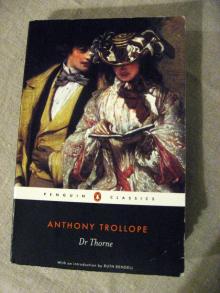 Doctor Thorne
Doctor Thorne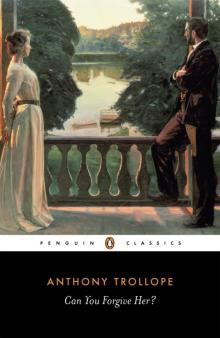 Can You Forgive Her?
Can You Forgive Her?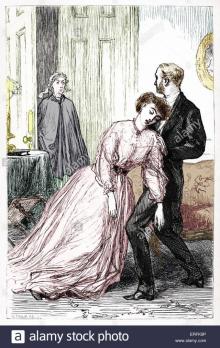 The Last Chronicle of Barset
The Last Chronicle of Barset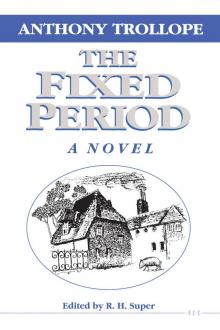 The Fixed Period
The Fixed Period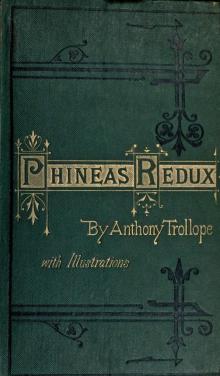 Phineas Redux
Phineas Redux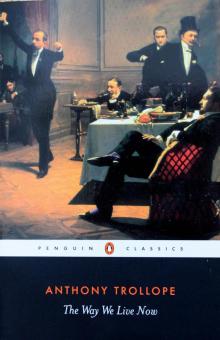 The Way We Live Now
The Way We Live Now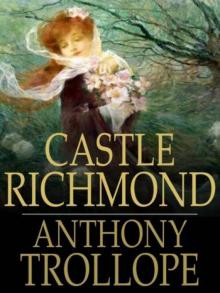 Castle Richmond
Castle Richmond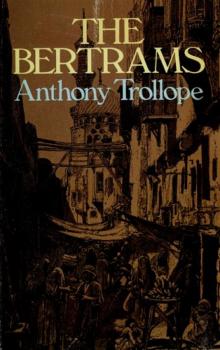 The Bertrams
The Bertrams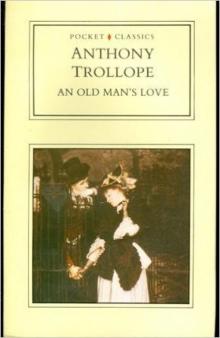 An Old Man's Love
An Old Man's Love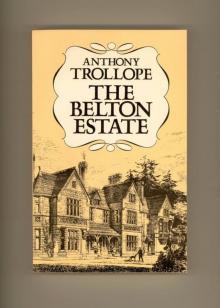 The Belton Estate
The Belton Estate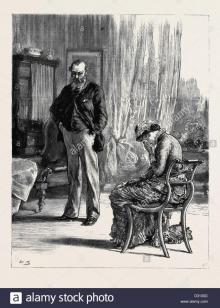 Marion Fay: A Novel
Marion Fay: A Novel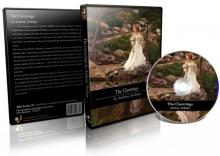 The Claverings
The Claverings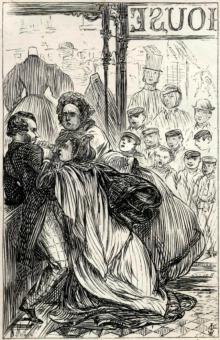 The Struggles of Brown, Jones, and Robinson
The Struggles of Brown, Jones, and Robinson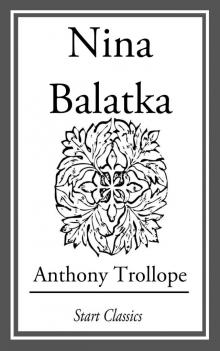 Nina Balatka
Nina Balatka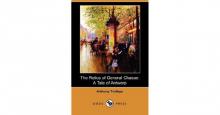 The Relics of General Chasse: A Tale of Antwerp
The Relics of General Chasse: A Tale of Antwerp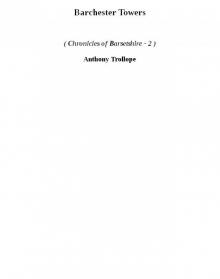 Barchester Towers cob-2
Barchester Towers cob-2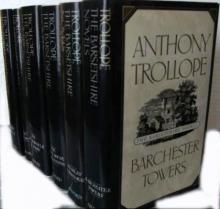 The Chronicles of Barsetshire
The Chronicles of Barsetshire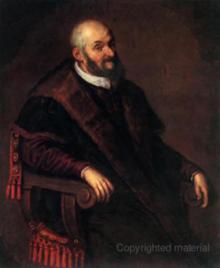 The Warden cob-1
The Warden cob-1 Framley Parsonage
Framley Parsonage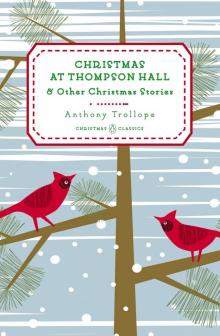 Christmas at Thompson Hall
Christmas at Thompson Hall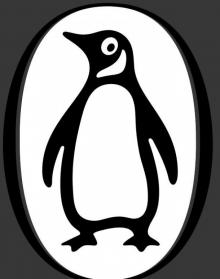 The Warden
The Warden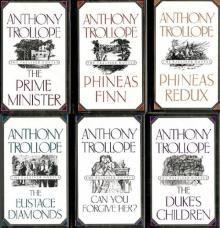 The Palliser Novels
The Palliser Novels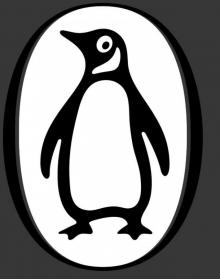 The Small House at Allington
The Small House at Allington Barchester Towers
Barchester Towers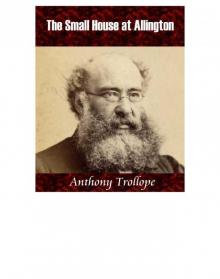 The Small House at Allington cob-5
The Small House at Allington cob-5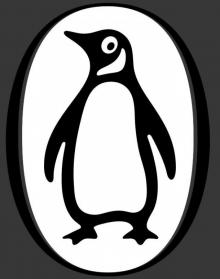 The Duke's Children
The Duke's Children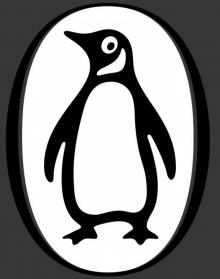 Phineas Finn, the Irish Member
Phineas Finn, the Irish Member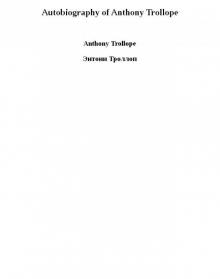 Autobiography of Anthony Trollope
Autobiography of Anthony Trollope